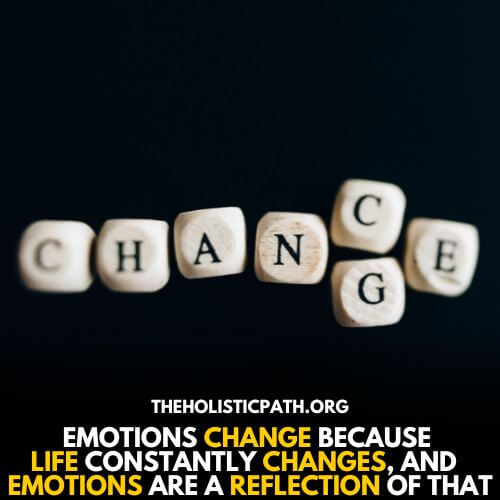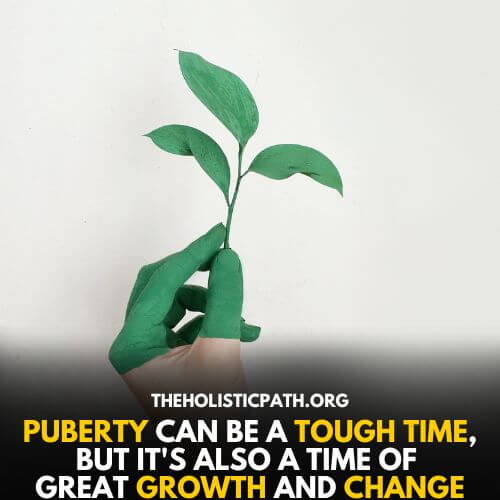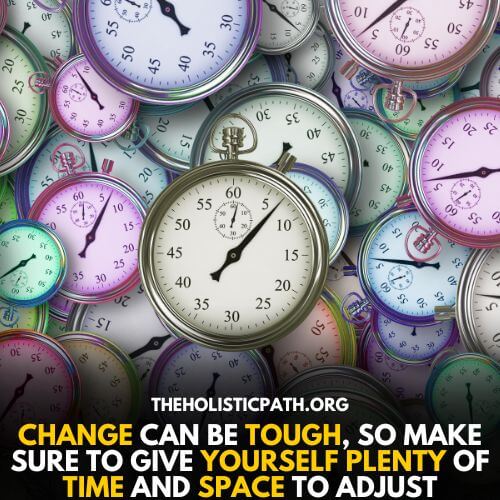It’s normal for emotions to change throughout the day. Emotions are like the weather- they can be sunny, cloudy, windy, or stormy. Just as the weather changes over time and from place to place, so do our emotions.
Some people believe that our emotions should be constant and unchanging. But this isn’t realistic- especially if you have a lot of different roles in life (e.g., employee, spouse, parent). In order to be successful in each role, you need to adjust your emotional state accordingly.
Let’s explore why emotions change and how we can manage them effectively.
Why Emotions Change
Emotions change for a reason. They serve as our body’s way of communicating with us, and they let us know when something is wrong or needs to be addressed. In fact, emotions are so important that we have an entire branch of the brain dedicated to processing them – the limbic system. This system is responsible for everything from regulating our stress levels to controlling our appetites.
Emotions Constantly Change And Fluctuate
Have you ever noticed how your emotions can change from one minute to the next? One minute you might feel happy, and the next you could be feeling sad or angry. Emotions are constantly changing and fluctuating, and there are a number of different factors that can affect our moods. For example, our emotions can be influenced by our environment, the people around us, our hormones, our physical state, and our thoughts and memories.

All of these factors can interact with each other to create the complex emotions that we experience on a daily basis. So why do emotions change? In short, it’s because life is constantly changing, and our emotions are simply a reflection of that.
5 Common Causes Of Change In Emotions
1. Mental Health Problems:
Emotions are strange things. They can be intense and all-consuming, or they can be so subtle that you barely notice them. They can make you feel happy, sad, angry, scared, or any other number of different emotions. And they can change quickly and without warning. So why emotions change?
There are a number of different mental health problems that can contribute to changes in emotions. For example, bipolar disorder is characterized by periods of high energy and happiness (mania) followed by periods of low energy and depression (depression). This back-and-forth can cause big changes in a person’s emotions.
Other mental health problems that can cause changes in emotions include anxiety disorders, ADHD, and OCD. All of these problems can make it hard for a person to regulate their emotions, leading to sudden changes. While it can be frustrating to deal with changing emotions, it’s important to remember that everyone experiences them from time to time.
And if you’re struggling to manage your emotions, there is help available. Talk to your doctor or a mental health professional to get the support you need.
2. Hormones:
Why emotions change? Hormones are one contributing factor to why a person’s emotions may change. When a person’s hormones are unbalanced, it can lead to feeling changes in emotions. For example, during puberty, teenage girls experience a surge in estrogen which can cause their moods to flux; they may feel happy one minute and then cry the next.
Similarly, when a woman is pregnant, her hormones are all over the place which can result in her crying at commercials or getting angry at her partner for no reason. While these hormonal changes are temporary and normal, if someone is constantly feeling emotional roller coasters, it could be indicative of a more serious problem such as depression or anxiety.
If you are constantly feeling up and down with your emotions, it’s important to talk to a doctor to see if there is an underlying condition.
3. Puberty:
It’s no secret that emotions can change a lot during puberty. Suddenly, you might find yourself getting angry more easily, crying more often, or feeling more anxious. You might also start to feel attracted to other people in a new way. So why emotions change during puberty?
There are a few reasons. For one, your body is going through a lot of changes. Hormones are raging, and your body is growing and developing in new ways. It’s no wonder that you might feel out of sorts!
In addition, you’re also trying to figure out who you are and where you fit in the world. It can be a confusing and overwhelming time.

Puberty can be a tough time, but it’s also a time of great growth and change. If you’re finding your emotions hard to deal with, talk to a trusted adult or seek professional help. Remember, you’re not alone.
4. Pregnancy:
When you’re pregnant, your emotions may feel like they’re all over the place. You might be more weepy than usual, or you might find yourself getting angry more easily. You might also feel more anxious or stressed than normal. So why do pregnancy hormones cause such big mood swings?
Well, during pregnancy, your body is going through a lot of changes. Your hormone levels are rising and falling, which can impact your mood and emotions. Plus, you’re dealing with the physical changes of pregnancy, as well as the cognitive changes (like worrying about becoming a parent). All of this can lead to some big emotional ups and downs.
Fortunately, there are things you can do to help manage your emotions during pregnancy. Exercise and relaxation techniques can help reduce stress and promote feelings of calmness.
Talking to a therapist or counselor can also be helpful in dealing with any emotional difficulties you may be experiencing. So if you’re feeling like your emotions are all over the place, know that you’re not alone—and that there are things you can do to get through this time.
5. Aging:
As we age, our bodies go through a lot of changes. We might not be able to run as fast as we used to or stay up as late at night. But one change that can be harder to deal with is the way our emotions can change. We might find ourselves getting angry more easily or feeling down for no reason. So why does this happen?
One reason is that our brains change as we age. The prefrontal cortex, which is the part of the brain responsible for controlling our emotions, can start to shrink. This can make it harder for us to control our emotions, which is why we might find ourselves acting on impulse more often.
Another reason why our emotions change as we age is because of the changes in our hormones. As we get older, our bodies produce less of the hormones that help to regulate our moods, like serotonin and dopamine. This can lead to feelings of anxiety and depression.
Of course, everyone experiences these changes differently. Some people might find that their emotions are more stable as they age, while others might notice more drastic changes. But if you’re finding that your emotions are starting to feel out of control, it’s important to talk to your doctor or mental health professional. They can help you figure out why you’re feeling this way and how to manage it.
Effect Of Environment, Thoughts, and Memories On Emotions
Why emotions change? It’s a question we’ve all asked at one point or another. And while there’s no single answer, there are a few factors that can contribute to a sudden change in emotions. For example, our environment can play a role. If we’re in a place that reminds us of happy memories, we may feel a sudden rush of positive emotions.
Alternatively, if we’re in a place that brings up negative memories, we may start to feel anxious or down. Similarly, our thoughts can also impact our emotions. If we’re ruminating on negative thoughts, it’s not surprising that we may start to feel negative emotions as well. Additionally, memories can also affect our emotions.
If we remember a time when we felt embarrassed or rejected, we might start to feel those same emotions in the present moment. Understanding why our emotions change can help us to better manage them and control how they affect us.
Other Health Conditions:
Some other health conditions can contribute to a person feeling a sudden change in emotions. Often, these health conditions are the root cause of why people feel sad, anxious, or blue. Here are some examples:
- Anemia: Anemia is a blood disorder that happens when there aren’t enough healthy red blood cells to carry oxygen throughout the body. This can lead to feelings of fatigue and low energy, which can in turn lead to feelings of sadness and irritability.
- Hypothyroidism: Hypothyroidism is a condition in which the thyroid gland doesn’t produce enough of the hormone thyroxine. This hormone helps to regulate metabolism, so when levels are too low, it can lead to fatigue, weight gain, and depression.
- Vitamin D Deficiency: Vitamin D is essential for good health and strong bones. But it also plays a role in maintaining proper levels of serotonin, the “feel-good” chemical in our brains. So a deficiency in vitamin D can lead to feelings of sadness and even depression.
While these are just a few examples, it’s important to remember that any chronic or serious health condition can have an impact on our mood and emotional state. If you’re feeling down or blue, it’s always worth talking to your doctor to see if there might be an underlying health condition causing your symptoms.
3 Common Triggers That Cause Change In Emotion
There are many different factors that can contribute to a person feeling a sudden change in emotions. Some common triggers include:
- Reacting to news or events: whether it’s something good or bad, big or small, news and events can trigger an emotional response. For example, you might feel elated after hearing that you got the job you wanted, or upset after learning about a natural disaster.
- Being around certain people: spending time with loved ones can obviously make us feel happy, but being around someone who is aggressive or negative can also affect our mood.
- Changes in routine: even small changes in our daily routine can throw us off balance and lead to emotional ups and downs. For example, we might get stressed out if we have to unexpectedly stay late at work, or feel down when we’re stuck in traffic.

Of course, everyone is different and will have different triggers for their emotions. It’s important to be aware of what affects your mood so that you can (hopefully) avoid any stressful situations.
Importance Of Being Aware Of Our Changing Emotions
When we’re caught up in the moment, it’s easy to let our emotions dictate our actions. But if we take a step back and analyze our feelings, we can often gain a better understanding of what’s driving them. This can be especially useful when our emotions are negative, as it can help us to pinpoint the source of our stress and find ways to cope.
Being aware of our emotions also allows us to enjoy the good ones more fully. Instead of letting them pass by without savoring them, we can reflect on what made us happy and plan activities that will help us feel that way again. Understanding our emotions is key to living a fulfilling life.
Emotional Changes Can Sometimes Be A Sign Of Something Wrong
We all go through emotional ups and downs, but sometimes these changes can be a sign that something is wrong. If you find yourself feeling more anxious or down than usual, it might be worth checking in with your doctor.
Emotional changes can be caused by a variety of factors, including physical illness, stress, and medications. For example, those who are dealing with a chronic illness may find that their emotions are affected by fatigue and pain. If you’re going through a difficult life event, such as a divorce or the death of a loved one, it’s also normal to feel more negative emotions. In most cases, these emotional changes will eventually subside.
However, if you’re struggling to cope or if your symptoms are interfering with your daily life, it’s important to seek professional help. With treatment, you can learn how to manage your emotions and live a happy, fulfilling life.
6 Tips For Dealing With Emotional Change
If you’re finding it tough to deal with constant changes in your emotions, here are a few tips that might help:
- Accept that change is a part of life. Don’t fight it or try to resist it. Instead, go with the flow and see where it takes you.
- Don’t take everything so seriously. Sometimes, it can help to just step back and laugh at the absurdity of it all.
- Talk to someone who understands. It can be really helpful to talk to someone who has been through similar experiences and can offer some insight and perspective.
- Be kind to yourself. Change can be tough, so make sure to give yourself plenty of time and space to adjust. And don’t forget to treat yourself with kindness and compassion along the way.
- Practice self-care. When our emotions are in flux, it’s important to take care of ourselves both physically and emotionally. This might include getting enough rest, eating healthy foods, and spending time doing things that make us happy.
- Give yourself time. Change can be hard, but try to remember that it’s also a natural part of life. Give yourself time to adjust to new emotional states, and don’t be too hard on yourself if you’re finding it tough going.

Conclusion
It’s clear that emotions change for a variety of reasons. Sometimes it’s due to our environment or the people around us. Other times it might be a result of our own physical or mental state. Whatever the cause, it’s important to understand why our emotions change so that we can better deal with them.
After all, our emotions play a big role in our day-to-day lives and can impact everything from our relationships to our work performance. By understanding why they change, we can learn to control them better and make sure they’re working for us, not against us.
